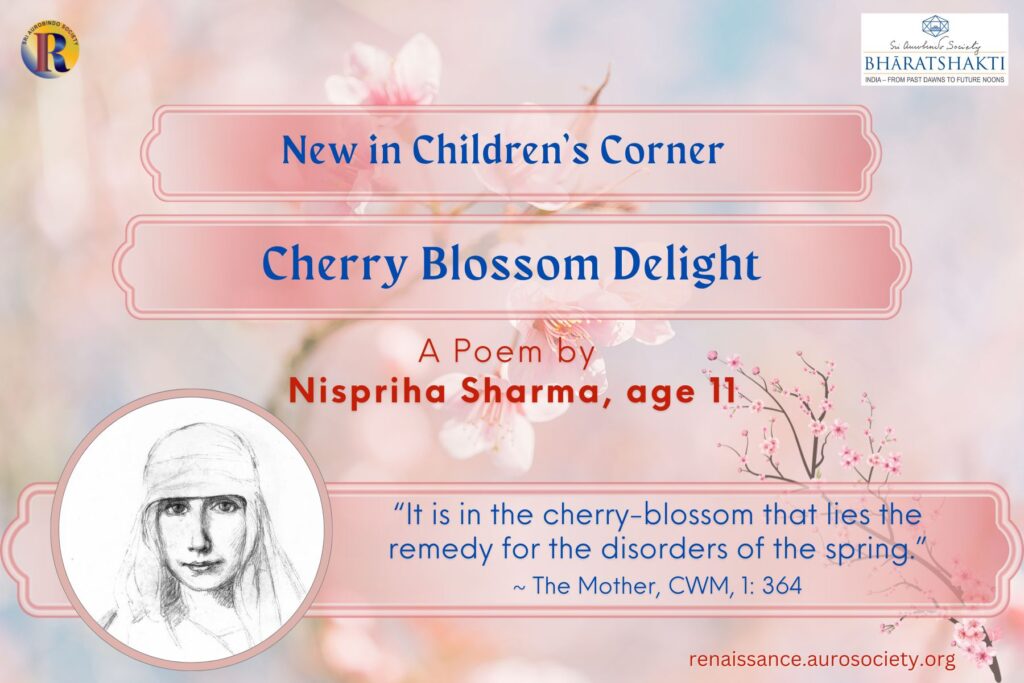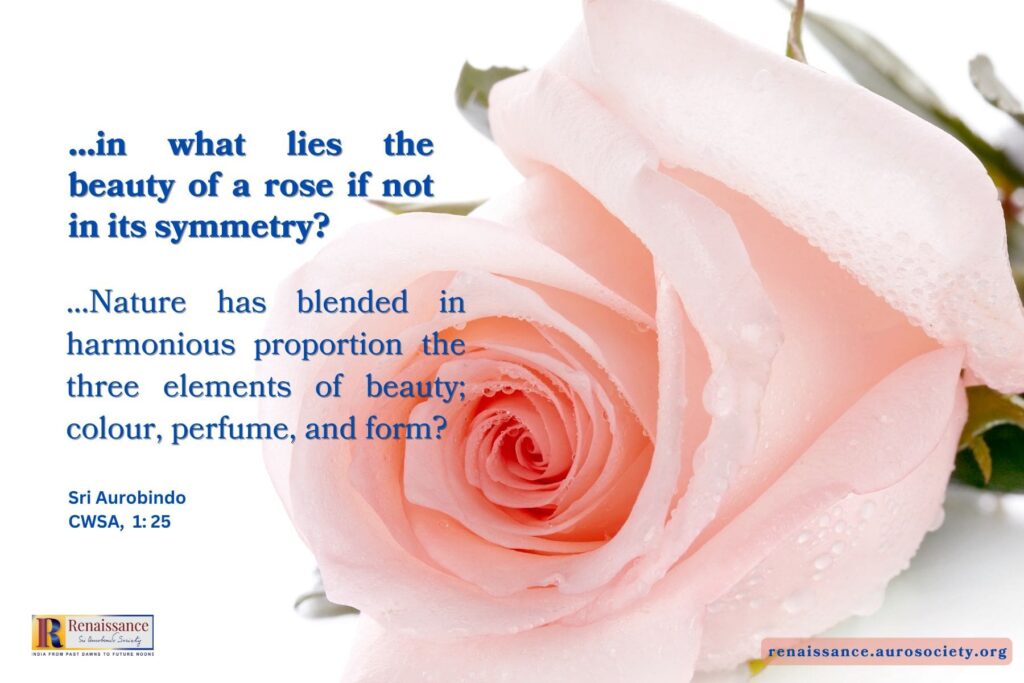Volume III, Issue 4
Author: Shraddha Gour Mohanit
Celebrating life and cultivating a zeal for living, despite all the obstacles and hardships, we stay rooted in the earth and all the joys it has to offer. But clouded by ego, human mind sometimes neglects that life is not only about humanity but all living creatures. In fact, there is consciousness in even inanimate objects; matter is also living and constantly transforming in a deeper sense.
It is generally believed that we humans have evolved to a higher level and hence we are the most developed species on the earth. This happened due to continuous effort of nature towards transformation. Our faculties of intelligence, comprehension, expression, formation of concepts and reasoning have developed better than all the other living species.
Animals and insects move mechanically guided by an intelligence about which they are not aware. Sri Aurobindo explains about the faculty of intelligence in animals in these words:
People say animals can’t think or reason. It is not at all true. Their intelligence has evolved to act only within the narrow limits of life, according to their own needs. But they have latent faculties which have not been developed.
~ Nirodbaran, Talks with Sri Aurobindo, 28 January, 1939
We can boast of our developed state but these words make us think that we are just a little ahead in the game of evolution and hence must learn to co-exist in harmony with other life forms. To share this planet with other species a few qualities are required such as benevolence, kindness, respect, love and mutual understanding. These qualities encompass the inherent goodness that is an incomparable virtue.
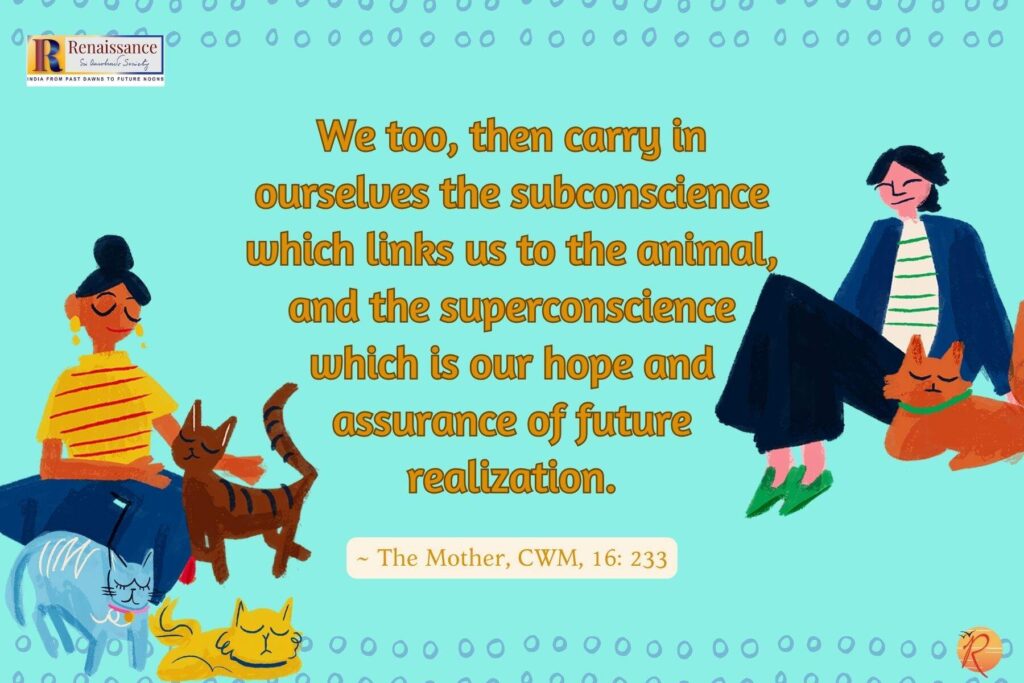
Goodness rises from within
Goodness is a quality that rises from within and resonates in the form of love, tireless benevolence, compassion etc. What we consider as good in our limited understanding is just something that is opposite of evil.
But when we broaden and deepen our understanding, we realise that goodness is a reflection of the Truth hidden in our deepest core. It is same as the Truth of goodness in ‘Prakriti’ or Nature. Goodness is not about ‘trying’ to be good but ‘being’ good because one cannot help it.
We all wish for what is good for us and our families. If our circle of concern is wider, we also wish for the good of our communities, our nation. When this wish to seek good extends and widens further to include all beings, that is a true feeling of goodness. This has been expressed in the famous Sanskrit prayer for universal well-being:
ॐ सर्वे भवन्तु सुखिनः
सर्वे सन्तु निरामयाः।
सर्वे भद्राणि पश्यन्तु मा कश्चिद्दुःखभाग्भवेत।
ॐ शान्तिः शान्तिः शान्तिः॥
oṃ sarve bhavantu sukhinaḥ
sarve santu nirāmayāḥ
sarve bhadrāṇi paśyantu mā kaścidduḥ khabhāgbhaveta।
oṃ śāntiḥ śāntiḥ śāntiḥ॥
The feeling of universal good is a psychic quality because it is founded on selflessness. Nature has bestowed her goodness upon all species alike. Being good is not a quality for ‘showing off’, but it is a state of natural readiness to be useful to other life forms. It is not about doing the right thing from the a moral-ethical standpoint because even ethics and morality are relative and products of faulty human mind. Goodness is an inherent essentiality that brings us closer to ourselves with a sense of contentment.
Goodness in animals
This inherent purity is difficult to cultivate within restricted and selfish human mindsets. Our developed mental faculties stop us from being selfless which requires an expanded consciousness.
But animals do reflect this virtue to a certain extent, since their reasoning and a few other mental faculties have not developed and they primarily move with their instincts and rudimentary mind which follows the movement of nature. Have you ever wondered why lonely people or even youngsters often prefer the company of animals to humans? Perhaps it has to do with the way animals radiate selfless and non-judgmental, unconditional love and self-giving.
Also see:
A Documentary on Peepal Farm, an Animal Rescue Farm
Animals also have feelings and emotions. The Mother explains:
Animals have an altogether rudimentary mind. They are not tormented by incessant thoughts like human beings. For example, they feel a spontaneous gratitude for an act of kindness towards them, whilst men, ninety-eight times out of a hundred, begin to reason and ask themselves what interest one could have in being good. This is one of the great miseries of mental activity.
~ The Mother, CWM, Vol. 5, p. 239
Animals are free from this and when you are kind to them they are grateful to you, spontaneously. And they have trust. So their love is made of that, and it turns into a very strong attachment, an irresistible need to be near you.
The Mother reminds us that in some animals there is “a very intense psychic truth.”
She further adds:
Naturally, I believe that the psychic being is a little more formed, a little more conscious in a child than in an animal. But I have experimented with animals, just to know; well, I assure you that in human beings I have rarely come across some of the virtues which I have seen in animals, very simple, unpretentious virtues.
~ The Mother, CWM, Vol. 4, p. 27
An inherent goodness is visible in animals because they do not have ill-will or wickedness in them. They are good because they cannot help it. This natural goodness of animals must be reciprocated with human goodness for the sake of goodness and not anything else.
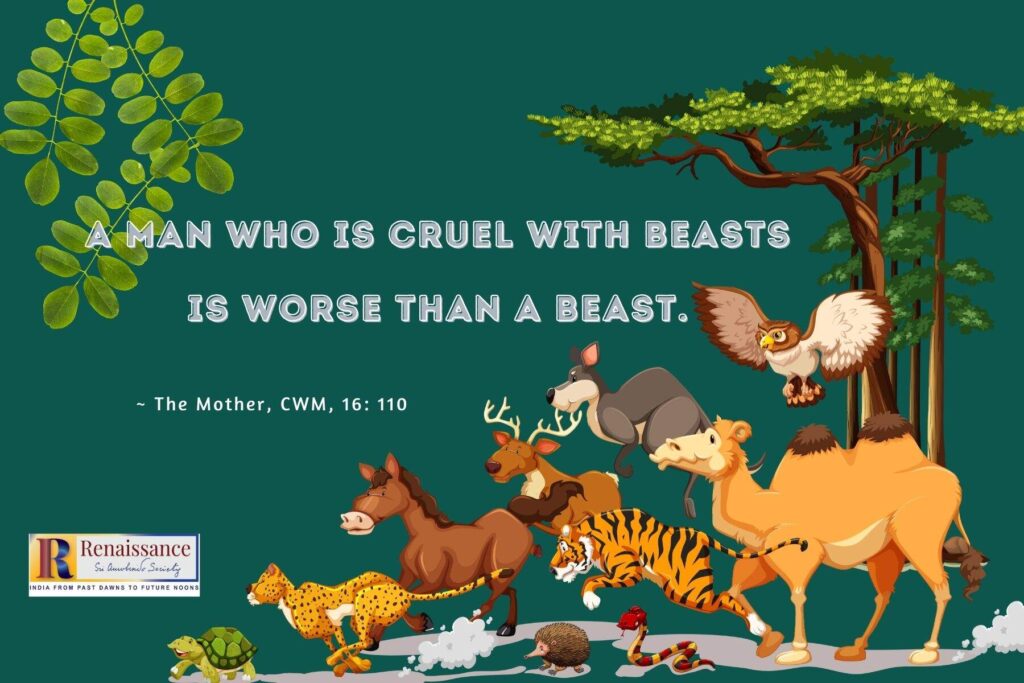
Our attitudes toward animals
“A man who is cruel with beasts is worse than a beast.” (The Mother)
~ The Mother, CWM, Vol. 16, p. 110
Our sages and seers have always been an epitome of love and goodness towards animals, towards all creatures. We have read about this in innumerable stories and legends. The oneness of all existence has been the eternal basis of our entire view of life.
But somewhere along the course of time, as humanity became more and more rational-materialistic in its orientation toward life and existence, the sense of interconnectedness and inter-dependence between nature and humans, between all creatures on the earth got lost.
With the growing mental curiosity, ambition and spirit of enquiry, humans even started interfering with the animal world for their selfish motives. This resulted in a great conflict between human interests and animal welfare.
We humans need to learn how to turn our developed intelligence, awareness and consciousness towards becoming better versions of ourselves. With greater psychic development in us we begin to see and treat animal and vegetal kingdom with respect and start pouring equal love and care as we do toward our fellow human beings.
A being living according to its own nature, its own truth, should spontaneously discover its own way of using things. When you live according to the truth of your being, you have no need to learn things, you do them spontaneously, according to the inner law. When you follow your nature spontaneously and sincerely, you are divine.
~ The Mother, CWM, Vol. 15, p. 347
Essentially, we are capable of loving with deepest depths like God.
But as the Mother explains further in the same conversation cited above, we must never forget that we human beings are the “deforming intermediary between the purity of the animal and the divine purity of the gods.” (p. 349) The work before us is to grow in the purity of goodness.
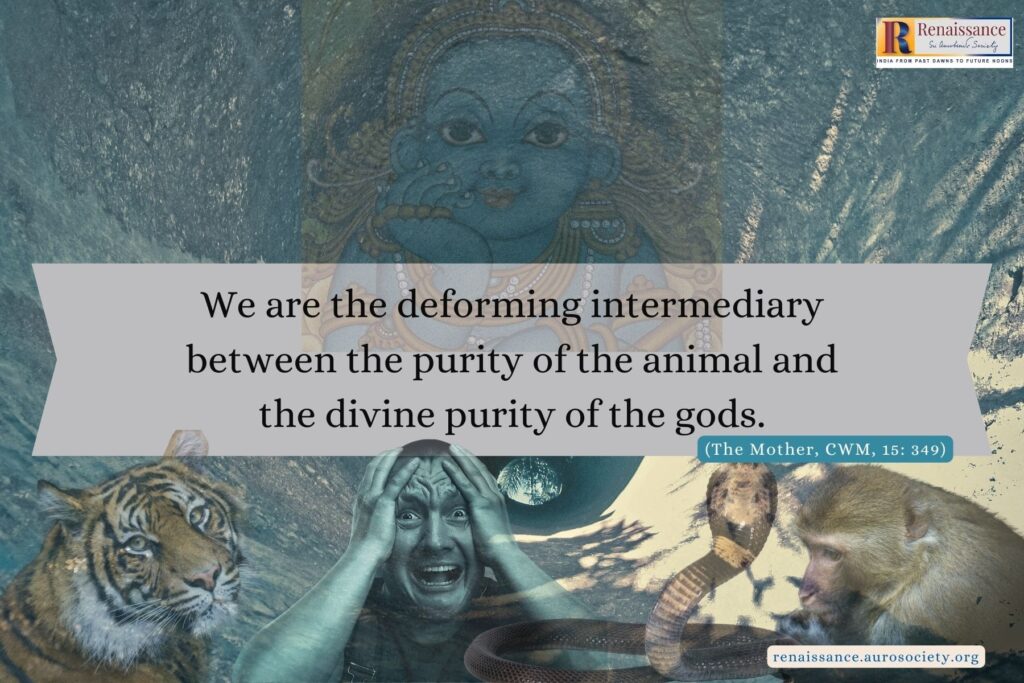
Thankfully, a growing section of humanity is beginning to appreciate the value of animals and other living organisms in sustaining the overall health of the environment. The realisation that we humans are not a superior species is also dawning. More and more people are recognising that animals are actually an extension of our consciousness because there is one Divine Soul that has become all Life.
The substance of our body is same as that of the earth; which is also present in all life forms. Consciousness which is sleeping and hidden in the mineral world, the Inconscient, which awakens slowly in the plant and animal kingdom, the subconscience, evolves and grows into consciousness and awareness in human beings with the coming of mind.
We too, then carry in ourselves the subconscience which links us to the animal, and the superconscience which is our hope and assurance of future realization.
~ The Mother, CWM, Vol. 16, p. 233
Goodness is not pity
Being good does not mean showing pity towards the animals because they are mute and incommunicado. Empathy and goodness go together; they are synonymous to each other.
Sometimes we are so occupied with our needs that we forget that all animals are a part of the big plan of nature and they are also connected to Mother Nature in the same way as we are. Without being empathetic towards them, we cannot strengthen this connection with Nature.
In ignorance, often people think that by keeping a pet animal at home and taking care of it, they have done enough for the animals. But this may not necessarily lead to growing in compassion towards all animals or living species. In fact, it can be argued that keeping animals as pets does not really herald us as being ‘good’ towards animals.
Perhaps being good to animals means just letting them be with their natural instincts; this may help in strengthening the mutual bond.
Perversion is a human disease, it occurs only very rarely in animals, and then only in animals which have come close to man and therefore have been contaminated by his perversion.
~ CWM, Vol. 9, p. 101
The Mother defines perversion as a deformation which is a denial of the life-instinct, an unhealthy interference of thought and vital impulse in physical life. She adds that it is an unhealthy impulse which does not usually exist even in animals. But over time with prolonged human contact, our pets begin to mirror ourselves. How we are from within begins to reflect in their behaviour as well.
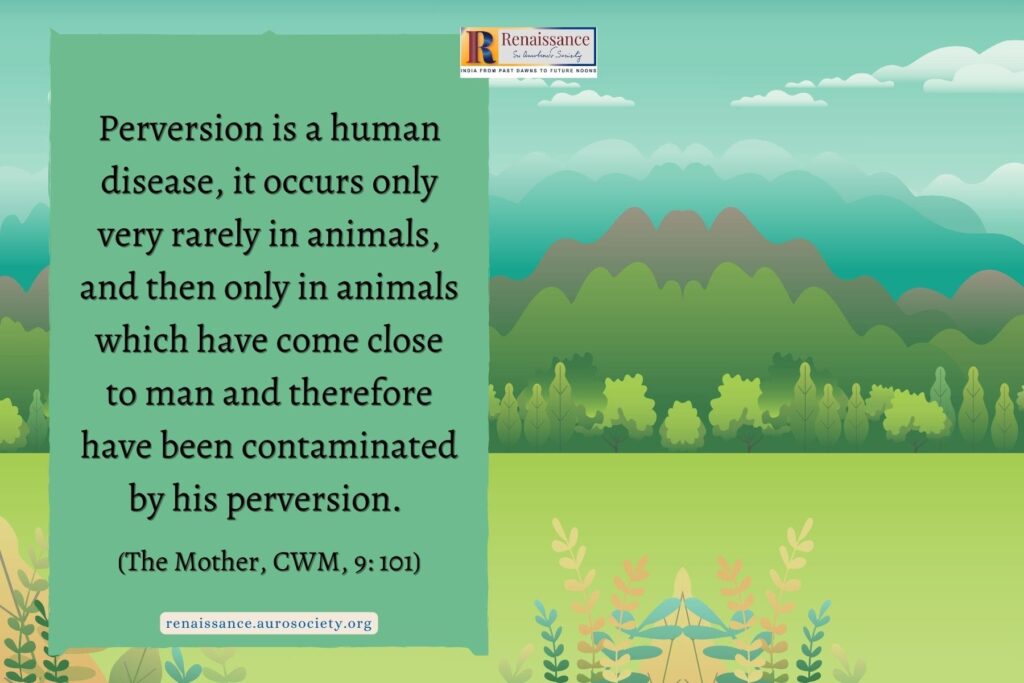
Following the Mother’s Example
At Sri Aurobindo Ashram, a natural mode of co-existence between humans and animals organically emerged as the Mother showered her compassion and divine love equally on all – humans and animals and all other creatures and objects. She could closely observe the latent faculties in cats.
The Mother went on to the extent of declaring that cats can meditate too because their consciousness is less scattered than of human beings. She also stated that each animal showcases a particular trait or virtue. For example, reindeer symbolizes endurance, bird symbolizes peace and cat carries the inherent quality of receptivity.
The Mother was once asked — “What kind of love do animals have for men?” Her reply is worth reflecting.
It is almost the same as that of rather unintellectual men for the Divine. It is made of admiration, trust and a sense of security. . . And it is not reasoned out: an admiration from the heart, so to speak, spontaneous.
~ CWM, Vol. 5, p. 239
Keeping this in mind, it becomes our duty to be kind towards all animals, not just our pets, and provide them with the sense of protectiveness and security. Our relationship with the animal world be it a cat or a dog, a cow or a lion, must be full of love, compassion and goodness. We find numerous instances of this in the way the Mother related to the animals in the Ashram area.
The Mother instructed people at Ashram not to interfere with the movements of animals, especially cats. She even named the cats roaming about in the ashram compound. Due to her immense love towards all living beings, she was able to understand them and value them. Her attitude towards animals is worthy of following.
About the relation between an animal and a human, the Mother says:
If the master is really a good one and the animal faithful, there is an exchange of psychic and vital forces, an exchange which becomes for the animal something wonderful, giving it an intense joy. When they like to be quite close to you in that way, when you hold them, it is that they vibrate internally. The force one gives them—the strength of affection, of tenderness, protection, all that—they feel it, and it creates a deep attachment in them.
~ CWM, Vol. 5, pp. 239-240
Even fairly easily, in some of the higher animals like dogs, elephants, and even horses, it creates quite a remarkable need for devotion (which indeed is not thwarted by all the reasonings and arguments of the mind), which is spontaneous and very pure in its essence, something that’s very beautiful.
The Mother teaches us that we should not carry a vibration of fear when faced with an animal. Rather, our attitude should be of kindness and empathy. Affection, tenderness, respect, appreciation and expression of a spontaneous love towards animals and all other living creatures – this is what goodness is about.
Let us conclude with these words from J. Allen Boone:

Don’t miss the story from our archives:
The Grateful Beasts and the Ungrateful Man
~ Design: Beloo Mehra


